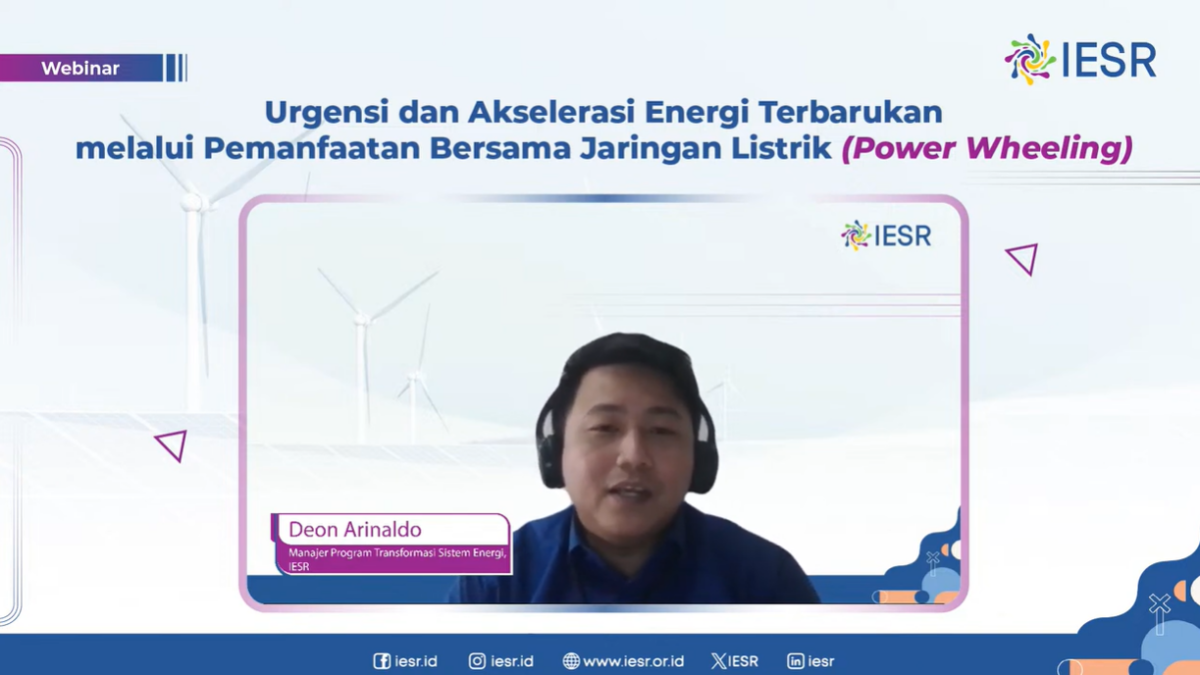Jakarta, 25 September 2024 – The establishment of a transmission network joint utilization scheme (wheeling) to accelerate the utilization of renewable energy in the New Energy and Renewable Energy Bill (EBET Bill) is still being discussed by the government and the House of Representatives (DPR). The Institute for Essential Services Reform (IESR) encourages the implementation of this scheme specifically for renewable energy as a strategic solution to expand environmentally friendly access for electricity consumers, especially industry, increase the adoption of renewable energy technology, achieve the renewable energy mix target, and the ambition of zero carbon emissions or net zero emissions 2060 or sooner.
Deon Arinaldo, Program Manager of Energy System Transformation at IESR, said the industry’s need for renewable energy is increasing along with the demands of the international market, which has various emission-tightening policies. This demand will get stricter, suggesting that the need for renewable energy could also increase faster shortly. According to him, the government needs to provide solutions that answer these needs, considering the slow development of renewable energy in Indonesia and the trend of renewable energy mix targets that have not been achieved.
“The certainty of broad access to renewable energy needs to be provided immediately to answer the needs of the industry, either through power wheeling or other mechanisms. Multinational companies, especially in the RE100 group, have targeted 100 percent renewable energy use by 2050. Ensuring access to renewable electricity will help these companies meet their decarbonization targets, including electrification of their supply chains. So access to renewable energy is a determining factor in the industry’s decision to reinvest in Indonesia in the future,” said Deon in the Webinar Urgency and Acceleration of Renewable Energy Development through Joint Utilization of Networks (Power Wheeling) organized by IESR on Wednesday (25/9/2024).
Deon emphasized that this power wheeling mechanism needs to be adjusted to the Indonesian context to provide renewable energy and optimize the use of existing electricity networks. For this reason, a mechanism is required that provides reasonable compensation to PT Perusahaan Listrik Negara (PLN) as the network owner but remains competitive for renewable energy consumers, such as RE100 member companies that commit to using 100 percent renewable energy.
His Muhammad Bintang, Coordinator of the Energy and Electricity Resources Research Group, IESR, added that using existing electricity networks through power wheeling schemes can be a strategy to accelerate renewable energy development. This scheme opens up opportunities for private participation so that renewable energy projects can be realized faster than the current centralized process.
“Market and private participation is expected to increase the competitiveness of electricity costs and encourage the development of the domestic renewable energy technology ecosystem. However, one of the challenges that must be considered is the potential overcapacity of power plants, both existing and planned, which are not absorbed by consumers. Therefore, the government needs to ensure that the power wheeling mechanism is designed to suit the needs of consumers, especially the industrial sector that needs a green label to increase the competitiveness of their products in the export market,” said Bintang.
According to Bintang, more detailed regulations related to power wheeling also need to be drafted immediately, including rules limiting the scheme to renewable energy, the wheeling charge (network usage fee), and strategies for strengthening the electricity network. This scheme can also be implemented in stages to test its effectiveness and refine related policies.
IESR considers that the EBET Bill’s clause on joint use of transmission networks or power wheeling can reduce industry doubts about the availability of renewable energy access. Thus, Indonesia will be on the right track to accelerate the energy transition and achieve a more ambitious renewable energy mix target, supporting global efforts to mitigate climate change.

